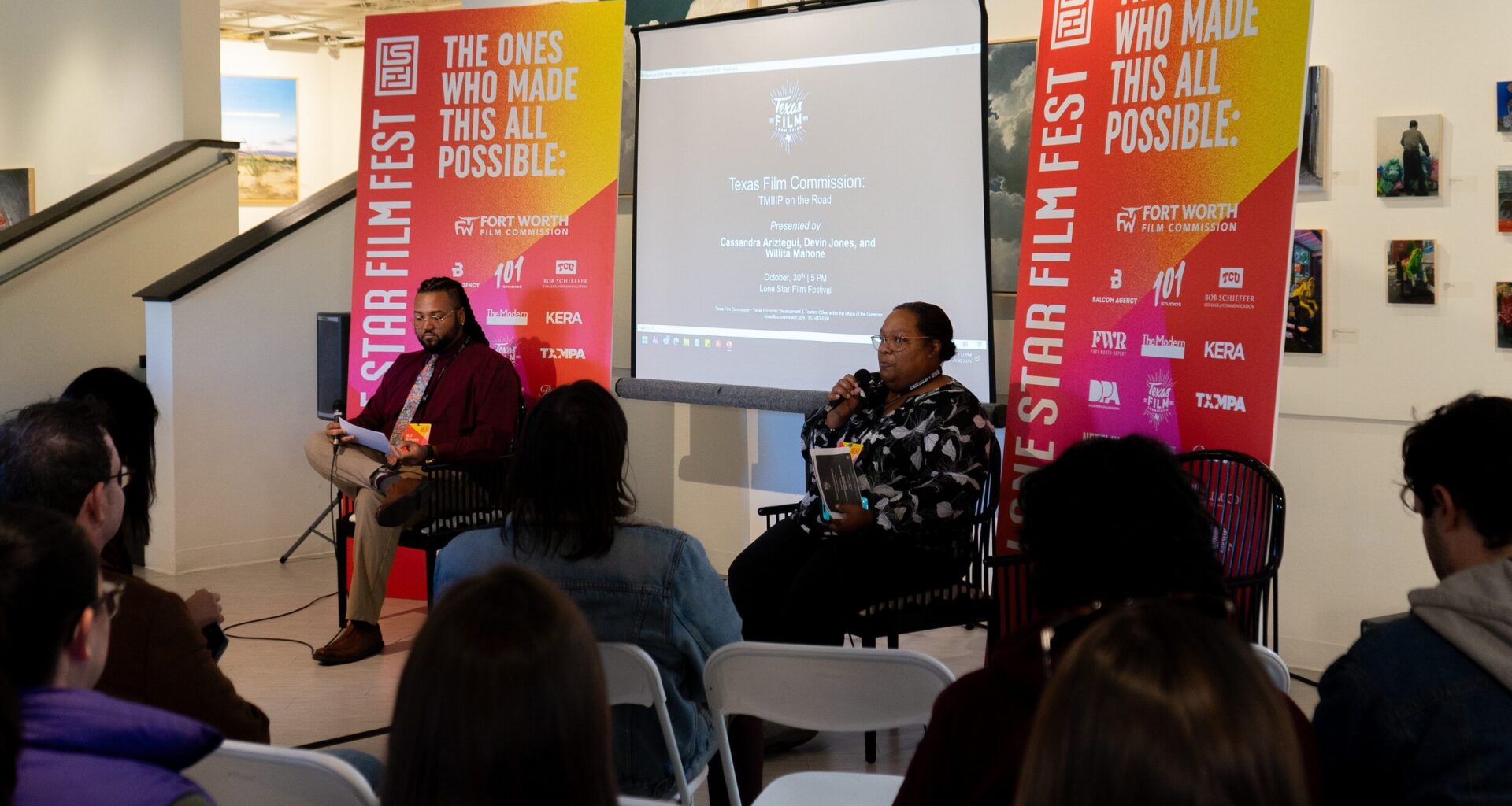With Texas officials releasing the first installment of their $1.5 billion film incentive package, Fort Worth filmmakers have new grants and resources available to make their in-state projects a reality.
“We want things made here in Texas, aren’t y’all tired of seeing things made somewhere that’s not here?” Willita Mahone, intake coordinator with the Texas Film Commission, told guests during a presentation at Fort Works Art Oct. 30.
Over 30 film enthusiasts and industry professionals gathered inside the Fort Worth art gallery for the Film Talk: Making Movies in Texas panel as part of the Lone Star Film Festival running through Nov. 5.
Members of the state’s commission discussed changes to the Texas Moving Image Industry Incentive Program, which is seeing $300 million allocated biannually through 2035 after Senate Bill 22 went into effect Sept. 1. The funds are the largest in the program’s 18-year history.
Filmmakers in need of financial support can apply for seven new grants through the program, each offering 1% to 2.5% rewards on top of a base incentive. The program offers assistance to Texas-made films, television shows, commercials and animation projects with a minimum budget ranging from $100,000 to $250,000.
Some grant requirements are still being finalized by the commission, but are described as:
Texas Heritage: Projects that promote family values or portray Texas positively.
Rural Filming: Movies shot in a county with a population of 300,000 or fewer.
Postproduction: Filmmakers spend at least 25% of their total in-state budget on postproduction work.
Faith-Based: Films designated as faith-based projects. Officials are still finalizing what type of movies will fall under this category.
Historic Site: Projects filmed at a historic site, such as the Alamo.
Workforce Development: Partnerships with higher education institutions to provide development opportunities during production.
These awards join the existing veteran grant, which offers a bonus to projects that hire Texas veterans as 5% of their cast and crews.
Filmmakers can stack awards with a base incentive up to 31% in financial assistance, said Cassandra Ariztegui, specialist with the state’s film commission. Funds won’t be allocated until after production ends and documents and expenses have been audited and approved, she added.
“You can treat the grants like a buffet,” Ariztegui said.
Interested in applying for a grant through the Texas Moving Image Industry Incentive Program?
Applications open 180 days prior to the start of production. Contact the Texas Film Commission at 512-463-9200 or film@gov.texas.gov for more information.
Created by Gov. Preston Smith in 1971, the Texas Film Commission fosters job creation and encourages economic development and tourism through media production. The commission also offers location assistance, permitting and legal guidance, connections to industry professionals, job hotlines, free license plates for productions and project promotion.
Before the new law, the incentive program’s budget varied with the every two-year legislative cycle. Lawmakers previously allocated $200 million during the 2023 session.
With the law, productions are required to complete 60% of the project in Texas and at least 35% of their cast and crew members must be in-state residents.
“We’re hoping that television projects, specifically, feel comfortable coming to film in Texas and feel comfortable to continue in the same place for longer than two years,” Ariztegui said.
The massive jump in investment by Texas lawmakers came in answer to a coordinated push from state filmmakers and actors like Matthew McConaughey and Fort Worth’s Taylor Sheridan to grow the industry.
Sheridan is currently building a Fort Worth campus that will be home to the largest production studio in Texas. He also filmed scenes for the upcoming season of “Lioness,” his spy series, in several of the city’s neighborhoods.
Mahone has heard some concerns about whether the majority of incentives will be awarded to major film studios and production companies, but she assures supporting independent filmmakers remains a priority.
“We know that Taylor Sheridan is here and he’s doing a lot, but there’s room at the table for everybody,” she said.
David Moreno is the arts and culture reporter for the Fort Worth Report. Contact him at david.moreno@fortworthreport.org or @davidmreports.
At the Fort Worth Report, news decisions are made independently of our board members and financial supporters. Read more about our editorial independence policy here.
Related
Fort Worth Report is certified by the Journalism Trust Initiative for adhering to standards for ethical journalism.
Republish This Story
Republishing is free for noncommercial entities. Commercial entities are prohibited without a licensing agreement. Contact us for details.

